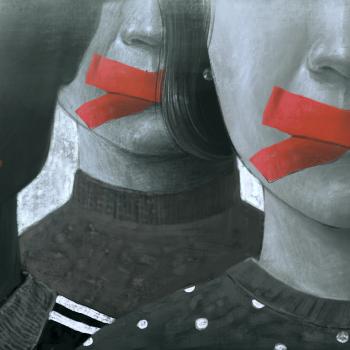It might not seem like it at this exact moment, but despite the coronavirus lockdowns and, well, riots, the United States and other Western countries are pretty decent places to live, as far as world standards go. Incomes are high, the air and water are generally clean, and governments have historically been comparatively effective and transparent. That’s not to say that these countries don’t suffer from gnarly problems – the U.S.’s painful ongoing struggles with racism are Exhibit A. It’s just that, all told, there are things to be grateful for.
Yet many of us – myself included – have spent (sometimes long) periods harshly criticizing our home countries, often for valid reasons. In my case, though, there was an ulterior motive: by honing in on America’s many flaws and evils, I was able to subjectively delegitimize, and so liberate myself from, any obligations that came with being part of it.
Recently, I wrote here about evolutionary anthropologist Michael Tomasello’s theory of moral obligation. According to Tomasello, obligation differs from sympathy by depending on legitimate social agreements. This foundation of legitimacy distinguishes obligation from more primal prosocial emotions, such as sympathy. We can feel gushes of sympathy for total strangers or even suffering animals, but obligations are something we only owe to those we have some kind of a preexistent agreement or relationship with.
In this telling, obligations can’t be unilateral. Sure, I could tell a total stranger to help me move. But that stranger would look at me as if I’d grown eight eyes before edging away cautiously. The only people who are actually obligated to help with a move are friends, family members, or hired help who have agreed to do so. It’s the mutuality of that agreement – whether contractual or informal – that creates a valid obligation.
The Childhood Roots of Obligation
Obligation has childhood roots in make-believe play. Tomasello’s research team has found that kids act differently if they’ve agreed to play a given game (“Okay, I’ll be the cop and you be the robber!”). Without that agreement, kids feel at liberty to ignore the rules or wander off. But once the rules and goals are agreed on, kids show a greater tendency to stick with the game – that is, they feel obliged to persist in it. Knowing that playmates are all upholding the same imaginary world helps kids relax into the game. Obligation prevents children’s play from fizzling out or spiraling into chaos.*
Childhood play in turn helps lay the foundations and build skills for the adult world of rules, shared norms, and institutions. We need this practice because, unlike play, most adult obligations aren’t intrinsically fun. They rarely call on us to, say, stretch out on the grass and gaze absently up at the clouds on a sunny day, a gentle smile brushing our lips.
No, adult obligations are things like pulling on hot, uncomfortable PPE to do your ten-hour shift in a crowded coronavirus ward, or changing a smelly diaper at 2:30 a.m. They’re typified by actions that we take not because we necessarily long do them, but in spite of the fact that, all things being equal, we’d really rather not do them.
Of course, one person’s obligations may be release for others, and vice versa. When I get a little free time, I excitedly grab a book of philosophy or theology – currently it’s St. Augustine’s City of God – and throw myself down on the couch, pen in hand, to devour a few chapters. For most people, this way of spending leisure time sounds precisely as fun as weeding an acre’s worth of crabgrass with tweezers. A lot of philosophy therefore only gets read by undergraduates who will, when the semester is past, immediately sell their volumes of Descartes or Hume or Kant straight back to the university bookstore, whistling cheerfully as they do.**
So, for me, reading philosophy is often a temptation that distracts me from my real obligations, such as washing dishes or, I don’t know, finishing overdue peer review assignments. For someone else, the temptation might be watching SportsCenter, sucking down a few 40-ounce bottles of malt liquor, or indulging in long naps. (For many of our society’s most well-credentialed, highly esteemed thought leaders, it’s carping at other people on Twitter.) The point is that our obligations typically don’t align with our personal leisure preferences. If we each lived in our ideal worlds, we’d all prioritize the fun things, not the duties.
Motives to Reject Legitimacy
There’s always an incentive, then, to wiggle out of our obligations. This is why societies reward people who fulfill their promises and viciously sanction those who break them: rewards and punishments encourage us to follow through on our obligations.
But external coercion isn’t the whole story. Rather, Tomasello believes that we internalize social pressure, building a private mental representation of the collective “we” so that we feel guilty when our actions fall short of collective ideals. The moral pressure comes from inside.
Given that obligation is internalized, what’s a would-be shirker of responsibility to do? Well, again, drawing on philosophers of language such as John Searle and Margaret Gilbert, Tomasello points out that obligations always imply legitimacy. This means that we only feel guilty when we break valid promises, meaning those that follow from some mutually recognized, binding, normative agreement between ourselves and an equal other party. By contrast, any obligations that don’t pass the mutuality test – that we don’t accept as legitimate – we can flaunt without guilt.
Political domination offers a particularly dramatic example of invalid obligations. When Hitler’s armies conquered and brutally annexed Poland in World War II, the 650,000 courageous Poles who joined the underground military resistance didn’t recognize a shred of legitimacy in Nazi rule. They therefore felt little obligation to obey the their conquerors’ laws, and in fact doggedly worked to undermine the Nazi regime without even a prick of guilt.
Cynicism as a Ploy
The Polish freedom fighters furnish one of history’s noble examples of the principled rejection of authority and obligations. Here’s a decidedly less admirable instance: as a young man obsessed with the deep flaws and failings in American society, I essentially refused to recognize the legitimacy of adult obligations in their entirety, because I associated them with the establishment or majority culture. From American Indian genocides to environmental rapaciousness and unjustified wars, from Jim Crow to the sheer banal ugliness of strip-mall architecture, I found little to respect in the land that had foisted citizenship on me at birth (without my consent, at that!).
The natural consequence of this reflexive criticism was, of course, a deep and crackling cynicism. One scholar calls cynicism a “B.S. detector, only with a dysfunctionally low threshold.” The most incorrigibly cynical people not only don’t trust other people; they don’t even see social conventions and constructs – the made-up rules of the adult social game – as real.*** Ancient Greek Cynics – the philosophical school from which we get the modern word – were notable for their rejection of social conventions and norms. They saw the entire social order as artificial, a big hoax fundamentally lacking legitimacy.
Deeply cynical people, then, don’t feel much internal pressure to fulfill obligations, because they don’t see social conventions and norms as legitimate, or even real. The entire social system – the nation-state, the social order itself – seems to be a forgery, an illegitimate and invalid manipulation for the benefit of the powerful and well-connected.
Which in many cases is perfectly accurate. But my own laser focus on society’s ills and falsehoods meant that, during my own most cynical years, I coincidentally enjoyed a terrifically convenient knockdown excuse for shirking on promises, for ignoring family obligations, for withholding my consent from society at large – for refusing, in other words, to make sacrifices for any reason that didn’t immediately serve my own purposes. Sure, I’d stay up late in college studying, but only because good grades meant better chances for a decent future – for me. Yet faced with some boring sacrifice that lacked any obvious payoff, I’d scoff and refuse to do it. And I’d feel morally righteous doing so. Because the whole social system was corrupt, man. It deserved my scorn.
“To Realize That It May Be Lost”
My cynicism and oikophobia, although genuine, let me have my cake and eat it too. I got to enjoy a life of relative privilege – traveling the world, learning languages – while at the same time recognizing no indebtedness to my country (which, for all its many flaws, had birthed the university system that educated me and the prosperity that enabled my travels). I felt angrily justified in my refusal to invest in the norms of American society, justified in taking without giving back anything, even my loyalty, in return.
This period of my life lasted an embarrassingly long time.
What snapped me out of it was a combination of graduate school, a growing sense of my own family’s history, and the increasing political instability I could sense building in the country. As a PhD student at Boston University, I did some work on Moral Foundations Theory. Encountering Jonathan Haidt’s work led me in turn to read some of the great conservative writers: Edmund Burke, Russell Kirk, Thomas Sowell. These thinkers acknowledged the inherent flaws and limitations of society while affirming the fundamental human need for shared rules and values, and for sources of discipline. This was a perspective I’d never encountered before. You could acknowledge your society’s imperfections yet still be loyal to it? An epiphany.
Meanwhile, a distant cousin put together a scrapbook about my dad’s ancestors. Knowing more about the long, hard journey across the centuries from England to the Mountain West gave me a newfound feeling of being at home in the world, while cultivating a sense of awe at what it took to bring this strange country into being. Ancestors of mine – their real flaws notwithstanding – sacrificed tremendously and lived very hard lives so I could inherit a homeland that – its real flaws notwithstanding – was, overall, comparatively stable and wealthy.
I began to feel grateful, even indebted.
But along with this dawning gratitude came the uncomfortable realization that these things didn’t have to last. I began to worry about the country’s stability and future. I watched as divisions grew between left and right, between rich and poor, urban and rural, white and black. We seemed to be hurtling toward crisis. As G.K. Chesterton wrote, “The way to love anything is to realize that it may be lost.” My new appreciation for the fragility of the place gave me a visceral sense of my obligation to help sustain it.
At a meta-cognitive level, what was most interesting to me – as someone who researches ritual, self-regulation, and culture – is that these developments in my moral life unexpectedly catalyzed a growing sense of accountability in completely different domains. A lifelong late sleeper and procrastinator,† I was surprised to find it easier and more natural to regiment my days. I developed a nighttime routine. I found it easier to prioritize responsibilities at work and, eventually, in my relationship to my fiancée and wife.
That is to say, I grew up.
That’s not just breezy storytelling. The developmental psychologist Erik Erickson defined psychobiological maturity in terms of accepting normative adult roles and obligations. Erickson called the rejection of those roles “negative identity.” He thought that people fell into negative identities when their circumstances didn’t provide the right incentives or opportunities to step into normative adult roles and obligations.
What’s Lost When Legitimacy Fails
What Erickson didn’t address†† was how this process can reverse itself: people who don’t want the dreary inconvenience of adult obligations can actively (if unconsciously) look for reasons to reject their society’s legitimacy, and so break from its associated responsibilities. All societies are unjust, so this isn’t a difficult task in principle – particularly in WEIRD societies that give their citizens a lot of personal freedom and latitude to question the rules.
In my case, though, the adult world of obligations turned out to be far superior to negative identity and ingratitude. I grew up rough. If I wanted to, I could find every reason to withhold my gratitude from the world. I’d be justified. I’m just glad I didn’t. I’m glad, for my own sake, that I found a way of seeing the world that gave it legitimacy in my eyes. It gave me guardrails.
My experience highlights two important points. First, revolutionary thinkers from Karl Marx onward have spilled oceans of ink agonizing over why people invest in and support the very social systems that oppress them. These writers only rarely seem to hit on the uncomfortable fact that legitimate obligations are a critical scaffold for our own stability and self-regulation. In this way, social or political legitimacy doesn’t just benefit the people at the top. It benefits everyone who, by accepting the social order, gains a potent means of effectively ballasting their lives. Even if the social system really is unjust.
Second, those who are most psychologically oppressed by a given social order – those most likely to reject its legitimacy – suffer a double injustice. They’re cruelly boxed out of society’s most esteemed roles and opportunities, relegated to the fringes and the lowest ranks. But in this alienation, they also miss out on the profound stability and self-discipline that emerges from perceiving legitimacy in the social game.
It’s odd timing, writing about legitimacy when race riots are burning Minneapolis to the ground. But my point isn’t that everyone should just “dig deep” and force themselves to believe in the system. Yes, there are people in those crowds who are doing what I once did: self-servingly using injustice as a justification for behaving badly. But race riots don’t come from nowhere. They send the message that the people rioting don’t see a social game worth playing, norms worth believing in. To them, the social universe fundamentally lacks legitimacy. In this they suffer a double tragedy.
____
* Calvinball is fun to read about in comic strips, but in real life it would be crazy-making.
** By contrast, my wife knows that if she ever hopes to get rid of even the most battered copy of Leibniz’s Monadology from my ever-growing, blob-like personal library, she will need to first somehow either induce me into a coma or actively hire burglars.
*** T.S. Eliot’s cryptic phrase in The Wasteland, “Unreal City,” comes to mind.
† Show me a writer who isn’t a procrastinator, and I’ll show you a rainbow unicorn.
†† At least as far as I remember. I’d need to go back and look it up to make sure, but all my books are at my office, whereas I am working at home on the couch for approximately the 87th week in a row.













